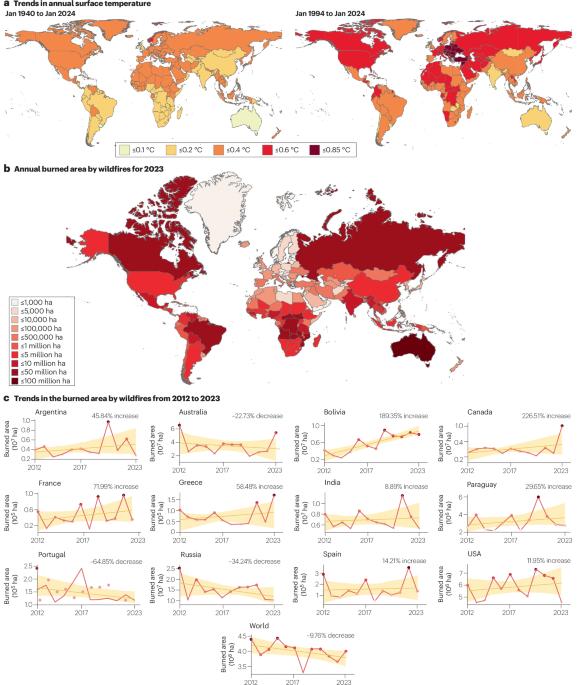Wildfire and power grid nexus in a changing climate
引用次数: 0
Abstract
Global wildfire events have had increasingly severe impacts in recent years, particularly in the western USA, driven by extreme fire-weather conditions, fuel accumulation and multiple ignition sources. Wildfires sparked by power lines tend to be larger and more destructive, as they often occur during high winds, which accelerate the spread of fires. Moreover, efforts to contain wildfires frequently result in power outages, causing considerable economic disruption. In this Review, we examine wildfire risks related to power-line-induced ignitions, infrastructure damage, climate-induced environmental impacts, grid operational risks, real-time grid management risks, vegetation management risks, and financial and funding risks in the context of a changing climate and their interdependence with power grid infrastructures. We then explore the resilience of power grids under wildfire threats, looking at risk analysis, prediction and mitigation strategies. The Review also shares practical insights and experiences in the USA to inform researchers, policymakers and industry professionals. This Review analyses the growing threat of wildfires to power systems, focusing on power-line-induced ignitions, infrastructure damage and climate-induced risks. It explores wildfire models and resilience strategies, and provides a roadmap for enhancing power grid resilience in the face of escalating wildfire challenges.

野火和电网在气候变化中联系在一起
近年来,由于极端的火灾天气条件、燃料积累和多种火源,全球野火事件的影响越来越严重,特别是在美国西部。电力线引发的野火往往更大,更具破坏性,因为它们经常发生在大风期间,这会加速火灾的蔓延。此外,遏制野火的努力经常导致停电,造成相当大的经济中断。在本综述中,我们研究了在气候变化及其与电网基础设施相互依赖的背景下,与电力线引燃、基础设施破坏、气候引起的环境影响、电网运行风险、实时电网管理风险、植被管理风险、金融和资金风险相关的野火风险。然后,我们探讨了电网在野火威胁下的恢复能力,研究了风险分析、预测和缓解策略。该评论还分享了美国的实际见解和经验,为研究人员、政策制定者和行业专业人士提供信息。本综述分析了野火对电力系统日益增长的威胁,重点关注电力线引燃、基础设施破坏和气候引发的风险。它探讨了野火模型和恢复策略,并提供了在面对不断升级的野火挑战时增强电网恢复能力的路线图。
本文章由计算机程序翻译,如有差异,请以英文原文为准。
求助全文
约1分钟内获得全文
求助全文

 求助内容:
求助内容: 应助结果提醒方式:
应助结果提醒方式:


